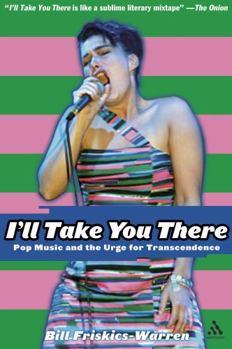I'll Take You There: Pop Music and the Urge for Transcendence
Select Format
Select Condition 
Book Overview
The urge to connect with that which transcends our experience, be it a higher power, another person or some artistic ideal or aspect of nature, is one of the things that makes us human. People view the object of this quest, as well as what it means to achieve it, differently. Yet regardless of how it is understood, the urge to participate in or belong to something greater and more lasting than ourselves-a feeling born of an awareness of our mortality-is what defines us as spiritual beings. Though often dismissed as ephemeral or, worse, demonic, popular music has given voice to this quest for transcendence since its beginnings. Pop singers are rarely as outwardly spiritual as, say, their gospel counterparts; they're forever pointing beyond themselves, though, be it to some better future, some higher ideal, or to some vision of deliverance. Fontella Bass's "Rescue Me," the Four Tops's "Reach Out (I'll Be There)," Jimmy Cliff's "Many Rivers to Cross," Afrika Bambaataa's "Looking for the Perfect Beat," and U2's "I Still Haven't Found What I'm Looking For" are but a handful of popular recordings from the past few decades that express a longing for something more. What, other than transcendence, is Jimi Hendrix talking about in "Purple Haze" when he shouts, "'scuse me, while I kiss the sky"? Or Van Morrison, in "Caravan," when he implores us to crank our radios and sail away with him into the mystic? Heard in the right light, secular and even carnal records have the power to speak to transcendental concerns, galvanizing their historical and cultural moments. Regardless of their spiritual leanings, all of the subjects discussed in this book (including Public Enemy, Madonna, Sleater-Kinney, Tricky, Johnny Cash, Nine Inch Nails, Moby, Marvin Gaye, Eminem, Polly Harvey, Bruce Springsteen and Sly & the Family Stone) make music that expresses a basic striving for transcendence. Artists' stories and personalities inform these discussions, but only in as much as they illuminate the struggles and concerns that run through their music. I'll Take You There is a beautifully written, wide-ranging and illuminating examination of some of the most potent popular music ever recorded.
Format:Paperback
Language:English
ISBN:0826419216
ISBN13:9780826419217
Release Date:September 2006
Publisher:Continuum
Length:276 Pages
Weight:0.90 lbs.
Dimensions:0.9" x 5.5" x 8.5"
Customer Reviews
1 rating
First Good Book about Pop Music and Spirituality
Published by Thriftbooks.com User , 19 years ago
I've read several books about pop music and spirituality, and all of them have one or both of two basic flaws: (1) an unsophisticated understanding of pop music/culture, and (2) an unsophisticated understanding of spirituality. This is the first book I've read which has neither flaw. Friskics-Warren, a Nashville music reviewer, is clearly steeped in pop music and culture and can discuss it and analyze it with subtlety and intelligence. He also holds a masters degree in theology and can bring his knowledge about religion and spirituality to his discussion of pop music. Thus, Friskics-Warren is able to see spirituality where others might not. Trent Reznor's angst and anger express a craving for something beyond this world. The Sex Pistols' calls for anarchy are actually calls against false forms of transcendence. Marvin Gaye's "Let's Get it On" is not a call for thoughtless sex, but for true connections with other people and maybe even with the divine. The best part about Friskics-Warren's analysis is that he is so skilled at arguing his points and so familiar with the artists he discusses that none of his claims seems far-fetched. Also excellent is that he does something most analysts of pop music forget to do: talk about the MUSIC instead of just the lyrics. Thus Van Morrison doesn't just sing about spiritual things; his music actually SOUNDS spiritual. Once again, this is the best book available on the subject. It should be read by lovers of pop culture and religion, lovers of pop music who are suspicious of religion (so they can see the implicit religion in pop music), and lovers of religion who are suspicious of pop music (so they can see that age-old religious traditions and contemporary pop music are in many ways after the same things).





